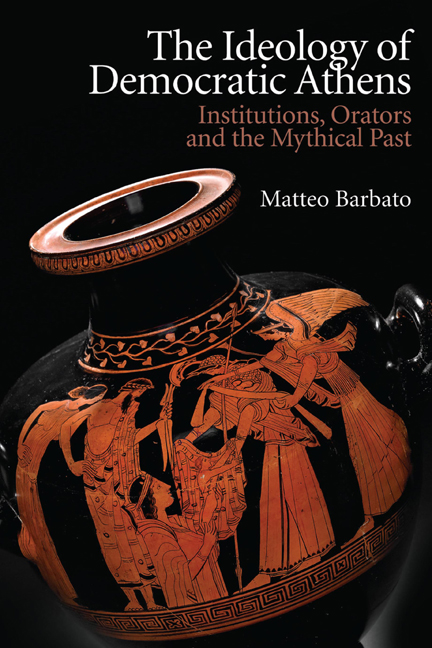Book contents
- Frontmatter
- Contents
- List of Tables and Illustrations
- Preface
- Abbreviations
- 1 Introduction
- 2 Myth and Athenian Democracy
- 3 The Discursive Parameters of Athenian Democratic Institutions
- 4 Exclusiveness and Eugeneia in the Myth of Autochthony
- 5 Between Charis and Philanthrōpia: The Heraclidae
- 6 Fading Shades of Hybris: The Attic Amazonomachy
- 7 Combining Hybris and Philanthrōpia: The Myth of Adrastus
- 8 Conclusions
- Bibliography
- Index Locorum
- General Index
- Frontmatter
- Contents
- List of Tables and Illustrations
- Preface
- Abbreviations
- 1 Introduction
- 2 Myth and Athenian Democracy
- 3 The Discursive Parameters of Athenian Democratic Institutions
- 4 Exclusiveness and Eugeneia in the Myth of Autochthony
- 5 Between Charis and Philanthrōpia: The Heraclidae
- 6 Fading Shades of Hybris: The Attic Amazonomachy
- 7 Combining Hybris and Philanthrōpia: The Myth of Adrastus
- 8 Conclusions
- Bibliography
- Index Locorum
- General Index
Summary
The evidence of public discourse provides modern scholars with a window onto the ideology of democratic Athens during the fifth and fourth centuries BC. At the state funeral for the war dead, an orator chosen to deliver the customary funeral speech would praise the Athenians’ equality within the community, their devotion to Greek freedom or their selfless pursuit of justice in the relations with other states. Speakers in the lawcourts would address boards of popular judges and appeal to the values of justice and the rule of law. The orators deliberating on public policy in the Assembly would advise what was best and advantageous for the city. Speakers addressing the Council would appeal to both considerations of justice and advantage. Even the dramatic festivals provided an arena for discussing a wide range of values significant for the community, from religious piety to the belief in the autochthony of the Athenians, and from the protection of suppliants to the appropriate attitudes towards honour, hybris or the law.
These are only some of the ideas, values and beliefs that underpinned Athens’ political life and have given rise to a fruitful scholarly tradition that has investigated Athenian democratic ideology. The works of Nicole Loraux and Josiah Ober are indisputably the most representative and influential products of such a tradition. Both have greatly enriched our knowledge of Athenian democracy, but they were based on different sets of sources and reached rather contrasting conclusions. Loraux explored the funeral speech for the war dead and determined that the genre was an ideological mask for Athens’ internal divisions and the exploitative reality of the Empire. Ober focused mostly on forensic and deliberative speeches and adopted a neutral, if not positive approach. He interpreted Athenian democratic ideology as the fixed set of ideas and values of the mass which were passively endorsed by the elite to vie for political influence, and concluded that this ideological compromise between mass and elite ensured the stability of the democracy for about two hundred years.
The contrast between Loraux's and Ober's views of Athenian democratic ideology is symptomatic of a broader dichotomy in the scholarship about ideology in the social sciences. Loraux's work, despite taking a slightly different direction, was inspired by the Marxist tradition, which provides a negative interpretation of ideology as false consciousness and as the ideas of the dominant class in a given historical period.
- Type
- Chapter
- Information
- The Ideology of Democratic AthensInstitutions, Orators and the Mythical Past, pp. 1 - 23Publisher: Edinburgh University PressPrint publication year: 2020



